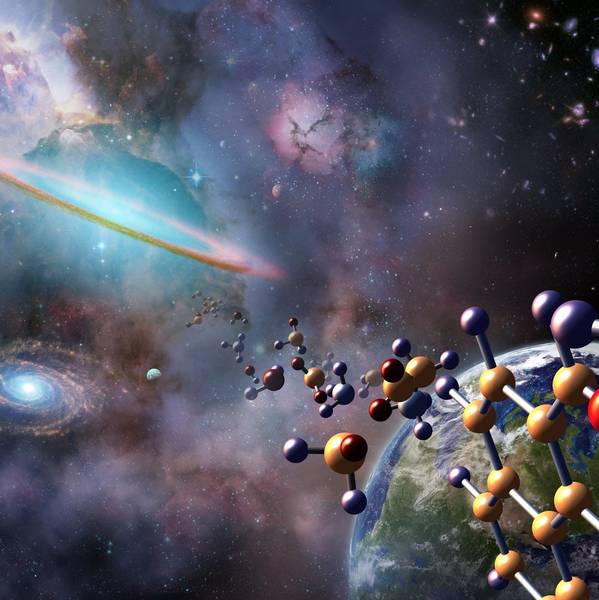ORIGINS Cluster gets green light
27.09.2018 —
The Excellence Cluster “From the Origin of the Universe to the First Building Blocks of Life (the “ORIGINS” Cluster) can begin work on January 1, 2019. The Excellence Commission set up under the auspices of the Deutsche Forschungsgemeinschaft (DFG) announced its decisions today. The interdisciplinary research network will study the evolution of the cosmos from the Big Bang to the emergence of life.
Understanding the development of the Universe, and determining whether life is a natural or even an inevitable consequence of its evolution, are among the greatest challenges facing science. Building on the insights gained by the foregoing Cluster devoted to the “Origin and Structure of the Universe“ and the organizational innovations it introduced, the new Origins Cluster will study new issues relating to the innermost structure of the Universe and its history, and address the question of the origin of life. In an interdisciplinary collaboration of unique scope, the researchers involved in the Cluster will explore the processes that led to the structures we now see in the observable Universe, and gave rise to stars, planets and living organisms.
“Over its 12 years of highly successful collaboration between around 250 astrophysicists, nuclear physicists and particle physicists, the Universe Cluster yielded many remarkable results and insights. This rich harvest would not have been possible without the pronounced interdisciplinary character of the whole approach. The lessons learned in the course of that undertaking provide the basis for the investigation of the new problems we have set for ourselves in the new Cluster. We are enormously pleased to hear that, with the decision to fund the new Origins Cluster in Munich and Garching, we can now address humanity’s oldest questions,” said the Cluster’s Coordinators Prof. Dr. Andreas Burkert (LMU) and Prof. Dr. Stephan Paul (TUM) in a statement today.
Input from two universities and seven other research institutions
The Origins Cluster is unique in that it brings together the fields of astrophysics, particle physics and biophysics, and can draw on the world-class research environment found in Munich and Garching. The participating institutions include LMU Munich, the Technical University of Munich (TUM), the Max Planck Institutes for Physics, Astrophysics, Extraterrestrial Physics, Plasma Physics and Biochemistry, the European Southern Observatory (ESO) and the Leibniz Supercomputing Centre.
Connector projects draw on different specialisms
The Cluster is organized into five major priority areas, which are tightly interconnected with each other by what are called connectors. Connectors are interdisciplinary research projects that explicitly rely on specialists from different areas of science to effectively tackle specific, complex problems. Examples include uncovering the links between planet formation and the earliest prebiotic molecules, and the role of dark matter in the formation of large-scale structures in the cosmos. Much of this work will be carried out in the context of international cooperations, and with the help of the world’s largest research facilities such as CERN and the ESO’s Very Large Telescope in Chile.
New facilities for specific tasks
To complement the laboratories set up in the context of the Universe Cluster, new research facilities are planned for Munich. One of these is the Origins Data Science Lab (ODSL), which will supplement the present Computational Centre for Particle and Astrophysics (C2PAP). The ODSL will combine the existing expertise in statistical data analysis, and develop the next generation of numerical and statistical methods needed to process the enormous and closely integrated data sets that the new Cluster will generate. The new analytical techniques will be available to all participating researchers. The purpose of the ODSL is to ensure that optimal analytical and simulation procedures can be applied to complex theoretical models and experimental observations, so that the correlations and insights hidden in the data can be teased out with the highest possible efficiency.
The new Ice, Dust and Sequencing Laboratory (IDSL) will host attempts to experimentally recapitulate the earliest cycles of Darwinian molecular evolution. The basic idea is to use controlled experiments to explore and understand central aspects of prebiotic molecular evolution, i.e. how non-living matter gave rise to informational biopolymers. The goal is to recreate in the laboratory the physico-chemical conditions necessary to trigger the formation of primitive self-replicating polymers, and to investigate the resulting cycles of replication, mutation and selection at the molecular level.
Outreach activities are part of the package
Today’s decision means that the successful partnerships with schools and the in-service education program for teachers of astrophysics, particle physics and biophysics set up in the context of the Universe Cluster can be extended. Lectures, demonstrations and exhibitions in the Deutsches Museum and at the ESO Supernova will enable members of the public to follow the advances in our scientific understanding of the Universe and life.
Contact Origins Cluster:
Prof. Dr. Andreas Burkert Cluster Coordinator (LMU)
Phone: +49 89 2180-5992
Email: burkert@usm.lmu.de
Prof. Dr. Stephan Paul Cluster Coordinator (TUM)
Phone: +49 89 289-12571
Email: stephan.paul@tum.de
Stefan Waldenmaier
Public Relations Manager
Phone: +49 89 35831-7119
Email: stefan.waldenmaier@universe-cluster.de






